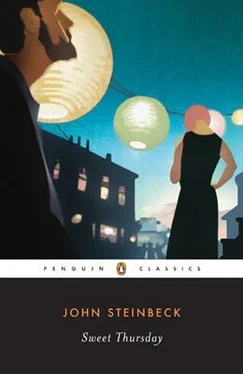John Steinbeck - Sweet Thursday
Здесь есть возможность читать онлайн «John Steinbeck - Sweet Thursday» весь текст электронной книги совершенно бесплатно (целиком полную версию без сокращений). В некоторых случаях можно слушать аудио, скачать через торрент в формате fb2 и присутствует краткое содержание. Год выпуска: 2008, ISBN: 2008, Издательство: Penguin Classics, Жанр: Классическая проза, на английском языке. Описание произведения, (предисловие) а так же отзывы посетителей доступны на портале библиотеки ЛибКат.
- Название:Sweet Thursday
- Автор:
- Издательство:Penguin Classics
- Жанр:
- Год:2008
- ISBN:1-4362-4126-X
- Рейтинг книги:5 / 5. Голосов: 1
-
Избранное:Добавить в избранное
- Отзывы:
-
Ваша оценка:
- 100
- 1
- 2
- 3
- 4
- 5
Sweet Thursday: краткое содержание, описание и аннотация
Предлагаем к чтению аннотацию, описание, краткое содержание или предисловие (зависит от того, что написал сам автор книги «Sweet Thursday»). Если вы не нашли необходимую информацию о книге — напишите в комментариях, мы постараемся отыскать её.
Cannery Row
Sweet Thursday — читать онлайн бесплатно полную книгу (весь текст) целиком
Ниже представлен текст книги, разбитый по страницам. Система сохранения места последней прочитанной страницы, позволяет с удобством читать онлайн бесплатно книгу «Sweet Thursday», без необходимости каждый раз заново искать на чём Вы остановились. Поставьте закладку, и сможете в любой момент перейти на страницу, на которой закончили чтение.
Интервал:
Закладка:
“Octopi can’t stand heat,” he said.
He recited no poetry to her. The subject of her eyes, her feelings, her skin, her thought, did not come up. Instead Doc told her about octopi—a subject that would have fascinated her two days before.
Doc said, “They’re wonderful animals, delicate and complicated and shy.”
“Ugly brutes,” said the girl.
“No, not ugly,” said Doc. “But I see why you say it. People have always been repelled and at the same time fascinated by octopi. Their eyes look baleful and cruel. And all kinds of myths have grown up around octopi too. You know the story of the kraken, [39] kraken: Legendary tentacled sea monster of gargantuan size, perhaps inspired by giant squid.
of course.”
“Of course,” she said shortly.
“Octopi are timid creatures really,” Doc said excitedly. “Most complicated. I’ll show you when I get them in the aquarium. Of course there can’t be any likeness, but they do have some traits that seem to be almost human. Mostly they hide and avoid trouble, but I’ve seen one deliberately murder another. They appear to feel terror too, and rage. They change color when they’re disturbed and angry, almost like the rage blush of a man.”
“Very interesting,” said the girl, and she tucked her skirt in around her knees.
Doc went on, “Sometimes they get so mad they collapse and die of something that parallels apoplexy. They’re highly emotional animals. I’m thinking of writing a paper about them.”
“You might find out what causes human apoplexy,” said the girl, and because he wasn’t listening for it, Doc didn’t hear the satire in her tone.
There’s no need for giving the girl a name. She never came back to Western Biological. Her interest in science blinked out like a candle, but a flame was lighted in Doc.
The flame of conception seems to flare and go out, leaving man shaken, and at once happy and afraid. There’s plenty of precedent of course. Everyone knows about Newton’s apple. Charles Darwin and his Origin of Species [40] Charles Darwin and his Origin of Species: Steinbeck is creating a myth here. According to Brian Railsback in Parallel Expeditions (1995), Darwin never claimed his theory “flashed complete” in such a way. However, the inductive process the novelist suggests, in which a theory emerges after a gathering of facts, does indicate his knowledge of Darwin’s method. Further, Steinbeck is essentially correct in stating that the naturalist spent the rest of his life “backing it up” (Darwin produced six editions of The Origin of Species in his lifetime, the last in 1872, ten years before his death). (p. 26)
flashed complete in one second, and he spent the rest of his life backing it up; and the theory of relativity occurred to Einstein in the time it takes to clap your hands. This is the greatest mystery of the human mind—the inductive leap. Everything falls into place, irrelevancies relate, dissonance becomes harmony, and nonsense wears a crown of meaning. But the clarifying leap springs from the rich soil of confusion, and the leaper is not unfamiliar with pain.
The girl said good-by and went away, and Doc did not know she was gone. For that matter he did not know she had been with him.
With infinite care Doc scrubbed out a big aquarium, carpeted it with sea sand, and laid in stones populated with sponges and hydroids and anemones. He planted seaweeds and caught little crabs and eels and tide-pool Johnnys. He carried buckets of sea water from the beach and set up a pump to circulate the water from tank to aquarium and back. He considered every factor within his knowledge—relations of plant and animal life, food, filtering, oxygenation. He built an octopus world within walls of glass, trying to anticipate every octopus need and to eliminate every octopus enemy or danger. He considered light and heat.
Eight of his octopi were dead, but the twenty living ones scuttled to the bottom of their new home and hid themselves, throbbing and blushing with emotion. Doc drew a stool close and peered into the little world he had made, and his mind was filled with cool green thoughts and stately figures. For the moment he was at peace. The pale expressionless eyes of the octopi seemed to be looking into his eyes.
In the days that followed, Doc’s disposition was so unpredictable that Mack exhausted every other possibility before he moved in on Western Biological for the two dollars he thought he needed.
Mack’s campaign was probably the most elaborate of his career. It began quietly, and only after a thorough preparation did it begin to take shape. Then spinnerets of emotion laced in and the heavy notes of tragic necessity began to be faintly heard. Drama grew, as it should, out of its inherent earth. Mack’s voice was controlled and soft—no trembling yet—just a reasonable, clear, but potentially passionate growth. Mack knew he was doing well. He could hear himself, and he knew that if he were on the receiving end he would find it impossible not to weaken. Why, then, did not Doc turn his eyes from the dimly lit aquarium? He had certainly said “hello” when Mack came in. A little shakily Mack cut in the vox angelica, the vox dolorosa, and finally a bendiga stupenda so moving that Mack himself was in tears.
Doc did not turn his head.
Mack stood stunned. It is a frightening thing to lay out everything you have, to finish, and have no response. He didn’t know what to do next. He said loudly, “Doc!”
“Hello,” said Doc.
“Don’t you feel good?”
“Sure, Mack. How much do you want?”
“Two dollars.”
Doc reached in his hip pocket for his wallet without lifting his eyes. Mack’s great performance had been wasted. He might just as well have simply come in and asked for the money. He knew he could never reach such a height again. A sudden anger came over him, and he considered refusing the money, but his natural good sense saved him. He stood there rolling the dollar bills between his fingers. “What’s got into you, Doc?” he said.
Doc turned slowly toward him. “There’s going to be one great difficulty,” he said. “How am I going to light them? It’s always a problem, but in this case it might be insuperable.”
“Light what, Doc?”
“We start with two obvious problems,” Doc continued. “First, they can’t stand heat, and second, they are to a certain extent photophobic. I don’t know how I’m going to get enough cold light on them. Would it be possible, do you suppose, to condition them, to light them constantly, so that the photophobia subsides?”
“Oh sure,” said Mack uneasily.
“Don’t be too sure,” said Doc. “The very process of conditioning might, if it did not kill them, change their normal reactions. It’s always difficult to evaluate responses that approximate emotions. If I place them in an abnormal situation, can I trust the response to be normal?”
“No,” said Mack.
“You cannot dissect for emotion,” Doc went on. “If a human body were found by another species and dissected, there would be no possible way of knowing about its emotions or its thoughts. Now, it occurs to me that the rage, or rather the symptom that seems like rage, must be fairly abnormal in itself. I have seen it happen in aquariums. Does it occur on the sea bottom? Is the observed phenomenon not perhaps limited to the aquarium? No, I can’t permit myself to believe that, or my whole thesis falls.”
“Doc!” Mack cried. “Look, Doc, it’s me—Mack!”
“Hello, Mack,” said Doc. “How much did you say?”
“You’ve already given it to me,” said Mack, and he felt like a fool the moment he’d said it.
“I need better equipment,” said Doc. “Goddam it, I can’t see without better equipment.”
Читать дальшеИнтервал:
Закладка:
Похожие книги на «Sweet Thursday»
Представляем Вашему вниманию похожие книги на «Sweet Thursday» списком для выбора. Мы отобрали схожую по названию и смыслу литературу в надежде предоставить читателям больше вариантов отыскать новые, интересные, ещё непрочитанные произведения.
Обсуждение, отзывы о книге «Sweet Thursday» и просто собственные мнения читателей. Оставьте ваши комментарии, напишите, что Вы думаете о произведении, его смысле или главных героях. Укажите что конкретно понравилось, а что нет, и почему Вы так считаете.










